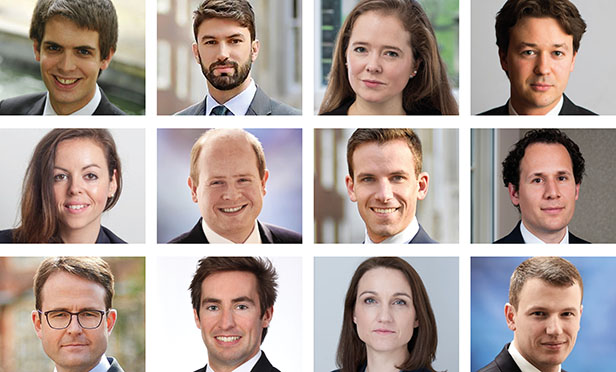Stars at the Bar 2017: this year's stars on the judiciary, Brexit and leaving private practice
Success at the Bar requires determination, energy and passion - here, Legal Week's Stars at the Bar 2017 talk about finding success and their concerns for the future of the profession
August 15, 2017 at 05:25 AM
12 minute read
Legal Week's Stars at the Bar 2017 share one obvious characteristic – their energy. All 12 of the up-and-coming barristers selected by their London peers as being at the top of their game are passionate about proactively promoting the law, even though the way they each do this differs.
Angeline Welsh of Matrix Chambers focuses on networking activities and an award-winning pro bono practice; Tom Owen of Keating Chambers is committed to the construction community; while Fraser Campbell and Andrew Lodder of Blackstone Chambers and One Essex Court are passionate about their academic legal work.
Another trait shared by all is that they all listen hard to what law firm partners and associates want and expect from their counsel; exchanging ideas and experiences and, above all, getting stuck in and becoming part of the team. There are no false distinctions between work that once would have been for barristers and that considered strictly for solicitors.
Unsurprisingly so, because another quality shared by a quarter of this year's Stars, is that they all previously worked in leading US or UK law firms before joining the Bar, working at Shearman & Sterling, Clifford Chance (CC), Freshfields Bruckhaus Deringer and Allen & Overy (A&O) respectively.
Making the swap
So why swap the relative security of private practice for a life at the Bar?
For Fraser Campbell, formerly of CC, it was about being able to focus on what he enjoyed most – being in court.
"Being a barrister allows you to focus all your attention on that side of the job, without all the other responsibilities that solicitor-advocates have. It is much easier," he says, adding that the greater variety of work though self-employment was also a draw.
 For Angeline Welsh, once of A&O, it was a difficult choice because she "loved practising in a law firm". But the prospect of greater flexibility in terms of working practice and the variety of work, combined with being able to focus on the law itself, was attractive. And while her former colleagues suggest she would have likely made partner at A&O, the lure of Matrix proved too attractive to pass by.
For Angeline Welsh, once of A&O, it was a difficult choice because she "loved practising in a law firm". But the prospect of greater flexibility in terms of working practice and the variety of work, combined with being able to focus on the law itself, was attractive. And while her former colleagues suggest she would have likely made partner at A&O, the lure of Matrix proved too attractive to pass by.
"When you are offered the opportunity to be part of an elite set like Matrix, it's quite hard to turn that down. It is the same career, but practising from a different platform."
More students will build experience – and savings – by training as a solicitor before joining the Bar
She admits her past experience has helped her a lot – enabling her to truly understand the pressure on solicitors and their clients when instructing counsel.
But the decision to first qualify as a solicitor sometimes has a more practical driver.
Sandy Phipps, who practised at Freshfields before joining One Essex Court, was first admitted in Sydney, where it is customary for barristers to start as solicitors before moving over, with direct entry to the commercial Bar in Australia and New Zealand increasingly difficult to achieve.
With cuts in public funding push candidates away from criminal and family law and competition for commercial pupillages increasing all the time, the same is also now true in the UK.
Campbell believes that as this competition increases, "more students will think about building up experience – and savings – by training as a solicitor before looking to transfer to the Bar".
 Silks who have followed the same path from private practice to the Bar include Ben Strong QC at One Essex Court, Patrick Goodall QC at Fountain Court Chambers and James Drake QC at 7 Kings' Bench Walk.
Silks who have followed the same path from private practice to the Bar include Ben Strong QC at One Essex Court, Patrick Goodall QC at Fountain Court Chambers and James Drake QC at 7 Kings' Bench Walk.
But this fluidity does not just go one way. Welsh points out: "There are also barristers who have gone the other way and done incredibly well; Lord Goldsmith QC, of Debevoise & Plimpton, is one such example."
She reasons that many solicitor advocates are choosing to take silk within law firms, rather than returning to or joining the Bar.
"Solicitor advocates practising in international arbitration now apply for silk as a matter of routine, something which was rarely done a decade ago," she observes.
While the number of solicitor advocates taking silk may not be as high as it had been hoped, recent examples include Herbert Smith Freehills' Paula Hodges QC, A&O's Matthew Gearing QC and Linklaters' Matthew Weineger QC, to name but three.
Ultimately, Welsh argues that what will drive some to the Bar rather than private practice is attraction to the law itself. She says: "The Bar will continue to attract those who want to focus on the law rather than management, have greater variety of practice and be conflict-free."
Tomorrow's judges?
Today's Stars at the Bar are tomorrow's judges. Worryingly for the state of the judiciary though, many of this year's stars are concerned about the future of the judiciary and reports of demoralised and disgruntled senior judges in courts such as the newly renamed Business and Property Court, which encompasses the Commercial Court and the Chancery Division.
Parts of the system now seem under real strain
A 2017 Judicial Attitudes Survey, published earlier this year, found that more than 40% of senior judges intended to retire within five years but recruiting their successors is becoming more difficult.
For Phipps, "if they are to be effective, judges must be given adequate resources". However, he does not believe this is happening, saying: "Parts of the system now seem under real strain; an obvious example being the immense and increasing workload of the Court of Appeal in recent years." He argues this undermines the judiciary's ability both to discharge its current responsibilities and to recruit new judges.
 His fellow chambers colleague, Lodder, agrees, arguing that it is important for the profession to cultivate and encourage junior members with diverse backgrounds and legal practices to join the judiciary. He warns: "Judges need to be properly supported for the bench to be an appealing prospect," adding that, "changes in recent years have made going to the bench less appealing to the junior Bar than it used to be."
His fellow chambers colleague, Lodder, agrees, arguing that it is important for the profession to cultivate and encourage junior members with diverse backgrounds and legal practices to join the judiciary. He warns: "Judges need to be properly supported for the bench to be an appealing prospect," adding that, "changes in recent years have made going to the bench less appealing to the junior Bar than it used to be."
Access to justice
Our stars also have concerns about the future of the civil courts as they deal with modernisation, digitisation and the prospect of online courts for the lower value cases.
Phipps acknowledges that aspects of the civil justice system are in need of urgent reform, including "the sad fact that the civil courts are practically inaccessible to most of the population". He is unconvinced however by the prospect of online courts.
Owen welcomes the online court, in being "intended, rightly, to promote access to justice", adding of the overall reforms that they are "sensible and, in the modern landscape, necessary".
For Fountain Court's Philip Ahlquist, who has argued cases against litigants in person on cases ranging from complex allegations of financial market manipulation in the High Court to small consumer claims trials, such investments could "make a huge difference", given the extent of judicial time spent helping litigants formulate their cases.
"A combination of an interactive online platform and legally-qualified court officers could make a huge difference and help defendants too," he says, noting the significant cost of defending such cases.
However, if it is not done properly Ahlquist fears there will be problems. He warns that digitisation is "high risk, because the proposal assumes that there will be a state-of-the-art interactive platform which helps claimants to formulate their cases".
He adds: "If it's anything less than that, then the County Court will be hit with a wave of chaotic trials and appeals, which will take years to deal with."
Brexit danger?
And what of the looming reality of Brexit in an ever-more international London Bar. As Essex Court's Tom Ford notes: "London has benefited from being something of a bridge between Europe and the rest of the world."
Brick Court's Daniel Piccinin, a competition lawyer, does not feel unduly threatened by Britain's future exit from the European Union, saying: "London's place in the financial world… [is] unlikely to change much after Brexit."
While many laws will need to change, Piccinin argues that London itself will retain its attractions as a venue for litigation. Welsh at Matrix Chambers agrees, acknowledging that "the implications of Brexit are uncertain", but adding: "We can be confident in London's reputation holding up."
The legal profession is one of the jewels in the crown – now is the time to think how best to polish it up
"As far as international arbitration is concerned, the legal infrastructure will not change post-Brexit.
"The legal profession is one of the jewels in the crown," she says, "and now is the time to think how best to polish it up so that it is not dulled by confusion and uncertainty."
Ford, though, is wary of potential changes caused by Brexit. He says he "has always loved the fact that as a lawyer in London you work alongside talented people from a whole range of backgrounds and nationalities", adding: "If Brexit results in a reduction in this diversity, I think it will be a significant loss."
He concludes that it is too early to know whether Brexit will damage London's standing, as much will depend on factors such as "the UK's participation in common European legal frameworks, in relation to things such as jurisdiction, judgments and insolvency".
Lodder, however, is more positive. He says: "I find my clients choose to litigate or arbitrate in London for reasons that have little to do with Britain's membership of the EU and everything to do with the quality of the legal services sector and the justice system here."
4 New Square's Lucy Colter argues it could have a positive impact, with London litigators likely to work harder to make a success of Brexit. If this happens, she says there may be "an even greater dynamism in London that should enhance our reputation".
The future of the Bar
Overall, many of the more than 200 people interviewed for this feature have concerns about the future of the Bar and Legal Week's stars are no different. Conroy shares concerns about the challenges caused by limited work in certain areas of law due to legal aid cuts, as well as increasing competition among juniors for commercial work, with solicitors also joining the fray for these instructions in some cases.
 Baiou agrees, saying: "The truth is that the challenges facing the junior Bar over the next five years, are the same ones it has been facing over the last five years: namely, the ever-increasing cost of training, coupled with the reduction in rates of pay at the publicly funded Bar."
Baiou agrees, saying: "The truth is that the challenges facing the junior Bar over the next five years, are the same ones it has been facing over the last five years: namely, the ever-increasing cost of training, coupled with the reduction in rates of pay at the publicly funded Bar."
He is concerned about the future: "I worry that this discourages some truly brilliant minds from applying to family and criminal sets and that even in my field of practice the rising cost of training can tempt outstanding, but less privileged, applicants to take the safer option of a training contract."
He is grateful for the support his set has given him, saying that One Essex Court's selection process and mini-pupillage "revealed it to be a thoroughly meritocratic, inclusive and informal environment in which to practise" – sentiments others echoed about their own sets.
His set, he says, put him at ease in applying: "When I was interviewed, very little interest was shown in anything other than whether I could think clearly about very difficult problems, which I found very refreshing."
Building a better business
The clerks who work with this year's Stars highlight their ability to work with people of all levels, from clerks of all levels to solicitors and clients.
Joe Ferrigno, joint senior clerk at Essex Court, says: "The younger generations of barristers are succeeding because they are able to form good working relationships with associates on particular cases, with solicitors appreciating counsel that they can telephone, or email, without formality to quickly and easily share views or discuss points."
Darren Burrows, senior clerk at One Essex Court, agrees, saying that it fits into a wider process of chambers investing in relationships, including through their juniors.
In doing so, they are fulfilling their clerks' expectations, their own, as well as their clients, and as one clerk concludes: "More importantly than anything else, they are nice to people."
Ben Rigby is the editor-in-chief of Commercial Dispute Resolution magazine. Click here for profiles of all of the Stars at the Bar 2017.
Methodology
Legal Week contacted up to 200 solicitors, barristers, Queen's Counsel and senior clerks to ascertain their views over an eight-week period, with more than 300 responses, including subsequent follow-up references, nominating recommended junior barristers of 10 years' call and under to create Stars at the Bar 2017.
- This year's Commercial Litigation & Arbitration Forum, which takes place in London on 2 November, will be co-chaired by Sarah Lee of Slaughter and May and John Reynolds of White & Case. To book your place contact Peter Doolan via email on [email protected] or call +44 (0) 203 868 7555. For sponsorship enquiries, email [email protected]. Click here for more details about the conference.
This content has been archived. It is available through our partners, LexisNexis® and Bloomberg Law.
To view this content, please continue to their sites.
Not a Lexis Subscriber?
Subscribe Now
Not a Bloomberg Law Subscriber?
Subscribe Now
NOT FOR REPRINT
© 2025 ALM Global, LLC, All Rights Reserved. Request academic re-use from www.copyright.com. All other uses, submit a request to [email protected]. For more information visit Asset & Logo Licensing.
You Might Like
View All
DeepSeek and the AI Revolution: Why One Legal Tech Expert Is Hitting Pause
4 minute read
What Happens When a Lateral Partner's Guaranteed Compensation Ends?

Lawyers React To India’s 2025 Budget, Welcome Investment And Tax Reform

Russia’s Legal Sector Is Changing as Western Sanctions Take Their Toll
5 minute readTrending Stories
- 1ACC CLO Survey Waves Warning Flags for Boards
- 2States Accuse Trump of Thwarting Court's Funding Restoration Order
- 3Microsoft Becomes Latest Tech Company to Face Claims of Stealing Marketing Commissions From Influencers
- 4Coral Gables Attorney Busted for Stalking Lawyer
- 5Trump's DOJ Delays Releasing Jan. 6 FBI Agents List Under Consent Order
Who Got The Work
J. Brugh Lower of Gibbons has entered an appearance for industrial equipment supplier Devco Corporation in a pending trademark infringement lawsuit. The suit, accusing the defendant of selling knock-off Graco products, was filed Dec. 18 in New Jersey District Court by Rivkin Radler on behalf of Graco Inc. and Graco Minnesota. The case, assigned to U.S. District Judge Zahid N. Quraishi, is 3:24-cv-11294, Graco Inc. et al v. Devco Corporation.
Who Got The Work
Rebecca Maller-Stein and Kent A. Yalowitz of Arnold & Porter Kaye Scholer have entered their appearances for Hanaco Venture Capital and its executives, Lior Prosor and David Frankel, in a pending securities lawsuit. The action, filed on Dec. 24 in New York Southern District Court by Zell, Aron & Co. on behalf of Goldeneye Advisors, accuses the defendants of negligently and fraudulently managing the plaintiff's $1 million investment. The case, assigned to U.S. District Judge Vernon S. Broderick, is 1:24-cv-09918, Goldeneye Advisors, LLC v. Hanaco Venture Capital, Ltd. et al.
Who Got The Work
Attorneys from A&O Shearman has stepped in as defense counsel for Toronto-Dominion Bank and other defendants in a pending securities class action. The suit, filed Dec. 11 in New York Southern District Court by Bleichmar Fonti & Auld, accuses the defendants of concealing the bank's 'pervasive' deficiencies in regards to its compliance with the Bank Secrecy Act and the quality of its anti-money laundering controls. The case, assigned to U.S. District Judge Arun Subramanian, is 1:24-cv-09445, Gonzalez v. The Toronto-Dominion Bank et al.
Who Got The Work
Crown Castle International, a Pennsylvania company providing shared communications infrastructure, has turned to Luke D. Wolf of Gordon Rees Scully Mansukhani to fend off a pending breach-of-contract lawsuit. The court action, filed Nov. 25 in Michigan Eastern District Court by Hooper Hathaway PC on behalf of The Town Residences LLC, accuses Crown Castle of failing to transfer approximately $30,000 in utility payments from T-Mobile in breach of a roof-top lease and assignment agreement. The case, assigned to U.S. District Judge Susan K. Declercq, is 2:24-cv-13131, The Town Residences LLC v. T-Mobile US, Inc. et al.
Who Got The Work
Wilfred P. Coronato and Daniel M. Schwartz of McCarter & English have stepped in as defense counsel to Electrolux Home Products Inc. in a pending product liability lawsuit. The court action, filed Nov. 26 in New York Eastern District Court by Poulos Lopiccolo PC and Nagel Rice LLP on behalf of David Stern, alleges that the defendant's refrigerators’ drawers and shelving repeatedly break and fall apart within months after purchase. The case, assigned to U.S. District Judge Joan M. Azrack, is 2:24-cv-08204, Stern v. Electrolux Home Products, Inc.
Featured Firms
Law Offices of Gary Martin Hays & Associates, P.C.
(470) 294-1674
Law Offices of Mark E. Salomone
(857) 444-6468
Smith & Hassler
(713) 739-1250









